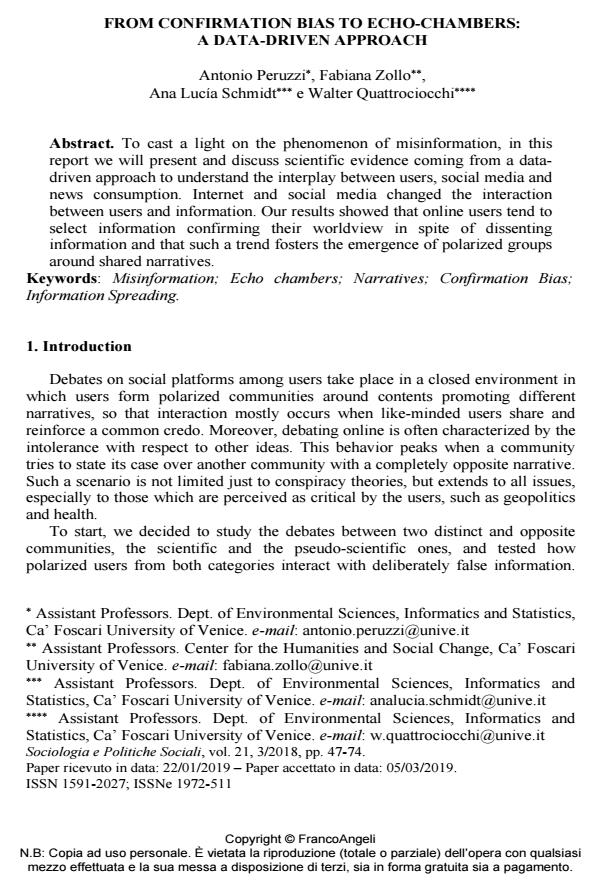From confirmation bias to echo-chambers: a data-driven approach
Titolo Rivista SOCIOLOGIA E POLITICHE SOCIALI
Autori/Curatori Antonio Peruzzi, Fabiana Zollo, Ana Lucía Schmidt, Walter Quattrociocchi
Anno di pubblicazione 2019 Fascicolo 2018/3
Lingua Inglese Numero pagine 28 P. 47-74 Dimensione file 1033 KB
DOI 10.3280/SP2018-003004
Il DOI è il codice a barre della proprietà intellettuale: per saperne di più
clicca qui
Qui sotto puoi vedere in anteprima la prima pagina di questo articolo.
Se questo articolo ti interessa, lo puoi acquistare (e scaricare in formato pdf) seguendo le facili indicazioni per acquistare il download credit. Acquista Download Credits per scaricare questo Articolo in formato PDF

FrancoAngeli è membro della Publishers International Linking Association, Inc (PILA), associazione indipendente e non profit per facilitare (attraverso i servizi tecnologici implementati da CrossRef.org) l’accesso degli studiosi ai contenuti digitali nelle pubblicazioni professionali e scientifiche.
To cast a light on the phenomenon of misinformation, in this report we will present and discuss scientific evidence coming from a data-driven approach to understand the interplay between users, social media and news consumption. Internet and social media changed the interaction between users and information. Our results showed that online users tend to select information confirming their worldview in spite of dissenting information and that such a trend fosters the emergence of polarized groups around shared narratives.
Parole chiave:Misinformation; Echo chambers; Narratives; Confirmation Bias; Information Spreading
- Conspiracy beliefs and perceptual inference in times of political uncertainty Salomé Leclercq, Sébastien Szaffarczyk, Pantelis Leptourgos, Pierre Yger, Alexandra Fakhri, Marielle Wathelet, Vincent Bouttier, Sophie Denève, Renaud Jardri, in Scientific Reports 9001/2024
DOI: 10.1038/s41598-024-59434-4 - Information Pollution as Social Harm: Investigating the Digital Drift of Medical Misinformation in a Time of Crisis pp.69 (ISBN:978-1-80071-522-6)
- Human Resource Development in South Korea Ahlam Lee, pp.235 (ISBN:978-3-030-54065-4)
- Science denial and medical misinformation in pandemic times: A psycho-criminological analysis Anita Lavorgna, Heather Myles, in European Journal of Criminology /2022 pp.1574
DOI: 10.1177/1477370820988832 - Interbrain Synchrony Mitigates Extremism Within Echo Chambers Aial Sobeh, Tomer Marcos Vakrat, Simone Shamay‐Tsoory, in Annals of the New York Academy of Sciences /2025 pp.117
DOI: 10.1111/nyas.70083
Antonio Peruzzi, Fabiana Zollo, Ana Lucía Schmidt, Walter Quattrociocchi, From confirmation bias to echo-chambers: a data-driven approach in "SOCIOLOGIA E POLITICHE SOCIALI" 3/2018, pp 47-74, DOI: 10.3280/SP2018-003004